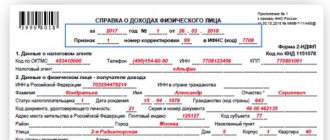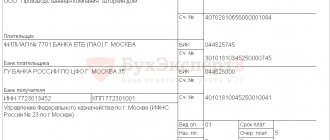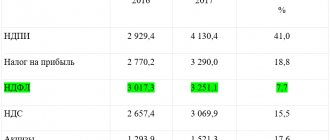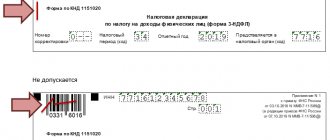If an employee is dismissed on the last working day, the employer is obliged to make a final settlement and pay all funds due. At the same time, the employer should not forget about his duties as a tax agent in relation to the income of his employees. When paying personal income tax upon dismissal of an employee, certain specifics must be taken into account in terms of the timing of the tax transfer and its calculation.
Dear readers! To solve your specific problem, call the hotline or visit the website. It's free.
8 (800) 350-31-84
Concept
Personal income tax - income tax. It is taxed on all income received in Russia. For citizens with tax resident status, the personal income tax rate is 13% (for those staying on Russian territory for more than 183 days during the year), for non-residents - 35%.
When receiving income related to work activities, the employee’s employer acts as his tax agent. He is obliged to calculate, withhold and transfer personal income tax for his employee. In accordance with Article 226 According to the Tax Code, the following categories of payers must withhold personal income tax:
- organizations (legal entities) registered in the Russian Federation;
- entrepreneurs;
- notaries;
- lawyers;
- separate divisions of companies.
Responsibility for calculating, withholding and paying personal income tax rests not with the employee as a taxpayer, but with the employer.
If an employee is dismissed on the last working day, it is necessary to make a final settlement with him and pay all due amounts (in accordance with Articles 84.1 and 140 of the Labor Code of the Russian Federation):
- salary for actual time worked;
- compensation for unused vacation upon dismissal;
- severance pay (if required by the Labor Code or provided for by a collective agreement);
- other compensation as agreed with the employee.
The date of receipt of all payments upon dismissal is considered to be the last working day for which the employee received income (according to paragraph 2 of Article 223 of the Tax Code). It is on this date that personal income tax should be calculated on the employee’s income (according to clause 3 of Article 226 of the Tax Code).
If the employer does not comply with the rules regarding the timing of payment of income to the resigning employee, then he will have to pay him compensation for each day of delay. In case of large-scale violations of labor legislation, the company faces administrative liability in the form of a fine of up to 50 thousand rubles. (under Part 6 of Article 5.27 of the Code of Administrative Offenses of the Russian Federation), and for the manager - up to criminal liability.
It is important to understand that responsibility for failure to pay personal income tax to the budget from labor income lies not with the employee, but with the employer.
There is one exception when determining the timing for final settlement. So, if on the last day an employee did not come to work to collect his work book, then the payment can be postponed to another day. For example, when an employee comes for payment or the next day (according to Article 140 of the Labor Code of the Russian Federation).
Payment of personal income tax by individual entrepreneurs for 2020
Author: Danchenko S.P. , expert of the information and reference system "Ayudar Info"
Question:
Expert opinion
Lebedev Sergey Fedorovich
Practitioner lawyer with 7 years of experience. Specialization: civil law. Extensive experience in defense in court.
Is an individual entrepreneur applying the general taxation regime required to submit Form 4-NDFL in 2020?
Answer:
The procedure for calculating and paying personal income tax by individual entrepreneurs applying the general taxation regime is established by Art. 227 Tax Code of the Russian Federation.
For many years, the norm provided for in paragraph 7 of Art. 227 of the Tax Code of the Russian Federation, according to which, if during the year individual entrepreneurs received income from business activities or from private practice, taxpayers were required to submit a tax return reflecting the amount of expected income from this activity in the current tax period in the tax period authority within five days after the expiration of a month from the date of occurrence of such income. In this case, the amount of estimated income was determined by the taxpayer.
The tax return form on the estimated income of an individual (form 4-NDFL) was approved by Order of the Federal Tax Service of Russia dated December 27, 2010 No. ММВ-7-3/ [email protected]
Thus, the above norms of the Tax Code of the Russian Federation directly established the right of the taxpayer to independently determine the amount of expected income for calculating advance payments for personal income tax. At the same time, the taxpayer had the right to determine the amount of estimated income in the amount of estimated income from business activities, taking into account the estimated expenses for conducting activities (which are a professional deduction for personal income tax).
According to paragraph 8 of Art. 227 of the Tax Code of the Russian Federation, the calculation of the amount of advance payments was made by the tax authority on the basis of the amount of estimated income reflected in the tax return in Form 4-NDFL, or the amount of income actually received from these types of activities for the previous tax period, taking into account tax deductions provided for in Art. 218 and 221 of the Tax Code of the Russian Federation.
This was the case back in 2020.
On 01/01/2020, the changes introduced by Federal Law dated 04/15/2019 No. 63-FZ in clauses 7 and 8 of Art. came into force. 227 of the Tax Code of the Russian Federation: individual entrepreneurs based on the results of the first quarter, half a year, nine months calculate the amount of advance payments based on the tax rate, actual income received, professional and standard tax deductions, as well as taking into account previously calculated amounts of advance payments.
This means the following:
1) there is no longer a need to submit a tax return in form 4-NDFL;
2) now the amount of advance payments is calculated not by the tax authorities, but by the individual entrepreneur himself;
3) the amount of advance payments for personal income tax must be calculated quarterly - based on the results of the first quarter, half a year, nine months;
4) when calculating advance payments, you can take into account professional and standard tax deductions for personal income tax, as well as the amount of advance payments;
5) advance payments for personal income tax should be calculated not from estimated income, but from actual income.
Since the concept of “estimated income” was not defined in the Tax Code of the Russian Federation, this allowed individual entrepreneurs to underestimate the amount of the advance payment for personal income tax. Now this will not be possible, since the amount of advance payments for personal income tax must be calculated from the actual income received.
This is important to know: Application for reduction of working hours
It can be assumed that the corresponding changes will be made to the tax return in form 3-NDFL, in which individual entrepreneurs will indicate all the necessary data for calculating advance payments. Based on this information, tax authorities will charge penalties in case of underpayment of advance payments.
Please note that in the current tax return in Form 3-NDFL, individual entrepreneurs indicate only the amount of advance payments actually paid (based on payment documents) on line 070 of Appendix 3 of the declaration. When calculating personal income tax for 2020, individual entrepreneurs will need to indicate the accrued amounts of advance payments somewhere in form 3-NDFL, which will require changes to form 3-NDFL.
Question:
In what order should an individual entrepreneur make advance payments for personal income tax in 2020?
Answer:
The usual procedure for paying personal income tax for individual entrepreneurs in 2020 was as follows (clauses 9 and 10 of Article 227 of the Tax Code of the Russian Federation).
Advance payments were paid by the taxpayer on the basis of tax notices:
for January – June – no later than July 15 of the current year in the amount of 1/2 of the annual amount of advance payments;
for July - September - no later than October 15 of the current year in the amount of 1/4 of the annual amount of advance payments;
for October - December - no later than January 15 of the following year in the amount of 1/4 of the annual amount of advance payments.
In addition, in the event of a significant (more than 50%) increase or decrease in income during the tax period, the taxpayer was required to submit a new tax return in Form 4-NDFL indicating the amount of estimated income from activities for the current year. In this case, the tax authority recalculated the amounts of advance payments for the current year based on unfulfilled payment deadlines. The recalculation of advance payment amounts was carried out by the tax authority no later than five days from the date of receipt of the new tax return.
From January 1, 2020, Federal Law dated April 15, 2019 No. 63-FZ, clauses 9 and 10 of Art. 227 of the Tax Code of the Russian Federation were declared invalid, and clause 8 of Art. 227 of the Tax Code of the Russian Federation is presented in a new edition, according to which advance payments based on the results of the first quarter, half year, nine months are paid no later than the 25th day of the first month following, respectively, the first quarter, half year, nine months of the tax period.
Thus, from 2020, the procedure for paying personal income tax by individual entrepreneurs is changing dramatically:
the tax authorities do not issue any notices, the individual entrepreneur himself calculates the amount of the advance payment (see above);
The deadlines for paying personal income tax have changed.
Taking into account the amendments made in 2020, individual entrepreneurs must pay personal income tax on time (including postponements) no later than:
01/15/2020 – last advance payment for 2020;
04/27/2020 – advance payment for the first quarter of 2020;
07/15/2020 – annual payment for 2020;
07/27/2020 – advance payment for the first half of 2020;
10/26/2020 – advance payment for nine months of 2020.
Since the deadline for payment of personal income tax established by clause 4 of Art. 228 of the Tax Code of the Russian Federation has not changed, the tax for 2020 will need to be paid no later than July 15 of the year following the expired tax period, that is, no later than July 15, 2021.
Deadlines for transferring personal income tax upon dismissal in 2018
In the case when citizens receive income not related to work activities (for example, selling an apartment), they calculate and transfer the tax once a year. The employer must transfer personal income tax regularly several times a month on payday.
As for personal income tax on income upon dismissal, it is paid with some special features. According to paragraph 6 of Art. 226 of the Tax Code of the Russian Federation, personal income tax from dismissal payments is transferred on the next working day after dismissal.
The deadlines for paying personal income tax upon dismissal in 2020 do not depend on the method of salary payment. The tax is paid to the budget no later than the day following the day of payment when income is transferred to a salary card, issued in cash from the cash register or from the employer’s bank account.
How much to pay: personal income tax calculation
It all depends on who and when the payment is made:
- The 13% deduction applies to all citizens of the Russian Federation. In this case, deduction occurs from the entire salary. If the accountant has already calculated the advance and transferred it to the employee’s card without deducting personal income tax, then he must perform the required actions from the entire salary during the calculation;
- Non-residents of the Russian Federation are taxed 30%. This means that citizens of other countries who work in the country must pay increased income tax.
Thus, the deduction depends on the time of settlement and citizenship. It is important to take into account during the calculation that not all types of profit are subject to income tax. If there are any payments that are listed in the Tax Code, then the accountant is obliged to indicate them in the report. However, you should not make a deduction from them.
If an error is discovered after submitting the reports, you must provide a corrected version of the document with comments. Late payment of taxes is considered a reason for the accrual of penalties. The same applies to incorrectly submitted tax reports.
Expert opinion
Irina Vasilyeva
Civil law expert
If a company ignores the requests of Federal Tax Service employees to correct errors in the provided data, then the current account may be blocked until the shortcomings are corrected.
Calculation and transfer procedure
From the amount that is paid to the employee in the form of dismissal, personal income tax is withheld at the standard rate of 13% (as well as from regular salary). The tax base for calculating personal income tax includes:
- Salary.
- Compensation for unused vacation.
- Severance pay exceeding the limit established by law (according to Letter of the Ministry of Finance No. 03-04-06/9881 of 2020).
According to Art. 225 Taxpayer personal income tax is calculated as tax base * 13%.
For example, on the last working day, an employee was paid a salary for the time worked in the amount of 26 thousand rubles. and compensation for unused vacation in the amount of 24 thousand rubles. Personal income tax withheld from wages amounted to 3,380 rubles, from compensation for unused vacation - 3,120 rubles. The employee received 43,500 rubles. (22620+20880) minus personal income tax 6500 rub. (3120+3380). The employer is obliged to transfer 6,500 rubles. the next day, it can be paid in one payment.
Taking into account this example, we can highlight the following procedure for paying personal income tax upon dismissal:
- The employer pays severance payments.
- Withholds tax from the specified income.
- Pays the employee income minus personal income tax.
- Transfers personal income tax to the budget at the employer’s location up to 1 non-working day.
For all personal income tax amounts withheld and transferred, the employer is required to report to the inspectorate in Form 6-NDFL. It is worth noting that this reporting form includes only taxable income so that there are no discrepancies.
For example, the salary received and compensation for unused vacation must be recorded in the report. Whereas severance pay is indicated only in that part that is subject to personal income tax. For example, an employee was paid severance pay in the amount of 60 thousand rubles, personal income tax was collected from 20 thousand of them. Consequently, only the amount of 40 thousand rubles is included in 6-NDFL, so that there are no discrepancies in accrued and transferred taxes.
It is worth noting that the tax base should be reduced by deductions provided by law. For example, for disabled people of the Second World War they are 3000 rubles, for Heroes of the Russian Federation - 500 rubles.
per month, for parents 1400 rub. for the first child and the same for the second, etc.
Employee tax calculation
The income of the company's employees includes:
- monthly salary;
- payment of vacation and sick leave benefits;
- cash allowances, bonus payments;
- other payments provided for in the employment contract.
When calculating the tax amount, the entire monthly income paid to the employee must be taken into account. This amount is the taxable base, from which tax is withheld at the rate of 13%. That is, the tax is calculated using the formula:
NB*13%, where NB is the sum of all monthly income of the employee (salary).
Important! The letter of the Ministry of Finance No. 03-03-06/1/610 dated September 24, 2009 states that the tax not transferred from the advance payment must be calculated during the final calculation.
Personal income tax on compensation for unused vacation upon dismissal
Compensation for unused vacation upon dismissal is considered taxable payments, therefore, personal income tax is charged on it.
At the same time, employers often have difficulties as to when it is necessary to transfer personal income tax from vacation compensation. After all, in relation to vacation pay, personal income tax is transferred not on the day of payment, but at the end of the month. The employer should take into account that compensation for unused vacation is not a vacation payment (according to Articles 114, 122, 126 of the Labor Code). The date of receipt of compensation is the last working day. Therefore, personal income tax is withheld on the employee’s last working day, i.e., he receives compensation already minus personal income tax.
In this case, personal income tax must be transferred to the budget no later than the next day (according to paragraph 6 of Article 226 of the Tax Code of the Russian Federation). For example, if an employee quits on May 22, then compensation minus tax is transferred to him on that day. And on May 23, the employer is obliged to transfer it to the budget.
But if the employer fulfills his duties as a tax agent ahead of schedule and transfers the tax on the day the income is paid, this will not be considered a violation.
Personal income tax on severance pay
Severance pay upon dismissal does not apply to mandatory payments. According to Art. 178 of the Labor Code, it is paid when the number or staff is reduced, as well as when the company is liquidated. It can also be paid by agreement with the dismissed employee, or its payment can be negotiated under the terms of a collective agreement.
The Labor Code provides for minimum limits for severance pay (if its payment is required by law). Thus, the employee is paid an average monthly salary on the day of dismissal, and another one - for the period of his employment (if he cannot find a job in the second month after dismissal). Severance pay for the third month is paid by decision of the employment service if the dismissed employee managed to register within two weeks after dismissal, and if the applying employee was not employed within 3 months.
Article 217 of the Tax Code and clarifications of the Ministry of Finance indicate that severance pay is paid only if it exceeds 3 average monthly earnings or 6 earnings for workers in the Far North. Within the specified limit, personal income tax is not charged.
Let's give an example of calculating personal income tax on paid severance pay. Engineer Potapov received severance pay in the amount of 105 thousand rubles upon dismissal. His average monthly salary was 25 thousand rubles. Accordingly, the non-taxable amount of severance pay amounted to 75 thousand rubles. From 30 thousand rubles (105000-75000) the employer must withhold and transfer personal income tax in the amount of 3900 rubles. The engineer will teach you 101,100 rubles. (105000-3900).
General information
The Tax Code of the Russian Federation has several articles that regulate the amount of personal income tax and the method of its calculation. All employees of the enterprise who have terminated their employment contract must be guided by them and refer to them in the event of any unusual situation. Otherwise, taxation of severance pay upon termination may become a big problem for them.
Cases with accrual
Very often there are situations when an employee of an enterprise, voluntarily or forcibly, leaves his place of work. After completing the documents, he is paid all payments provided for by the Labor Code. When receiving monetary compensation, you must consult with specialists and accurately determine whether severance pay upon dismissal is subject to personal income tax or not.
Payment can be accrued in the following cases of termination of an employment contract:
- liquidation of an enterprise, company or organization;
- staff reductions due to the closure of certain divisions of the company;
- conscription of an enterprise employee for military service;
- lack of employee consent to changes introduced into the employment contract;
- the employee’s refusal to be transferred to another position for medical reasons;
- inability to hold a certain position due to deteriorating health;
- declaring a company employee incompetent;
- dismissal for any violations (only if there is documentary evidence of the commission of an offense);
- termination of an employment contract for reasons beyond the control of the worker.
If an employee is laid off for one of the listed reasons, he is paid a standard benefit, which is monetary compensation for breaking the employment relationship. Based on this, income tax for individuals is calculated on preferential terms. In this case, collection is provided only from the amount that exceeds the limit established by the Tax Code. For residents of most regions of Russia, it is 3 average monthly salaries, and for workers performing their work duties in the Far North, it is 6 salaries per month.
No collection situations
In some cases, a dismissed employee of an enterprise has the legal right not to pay personal income tax on severance compensation. All of them are specified in the Tax Code of the Russian Federation and must be taken into account. Otherwise, the assessment of the mandatory payment will be considered illegal and may be challenged in court.
Such cases include:
- dismissal of an employee by agreement of the parties, if the employment contract states an amount that does not exceed 3 months’ salary (six months for workers in the Far North);
- removal from the position of a manager due to the dissolution of a unit or liquidation of the entire enterprise (only in case of receipt of benefits, the amount of which does not exceed earnings for the last 3 months);
- severance of labor relations with the deputy director and chief accountant (under the same conditions as for the manager).
It is important to remember that if an employee is dismissed for any reason not related to his own desire, the money earned over the last 30 days is added to the mandatory benefit.
This additional amount is not taxed and is therefore issued in full. In addition, if a dismissed employee was unable to quickly find a job, he has the right to count on an extension of payments (no more than 2 months), similar to severance pay. In this case, the person must be officially registered at the employment center.









